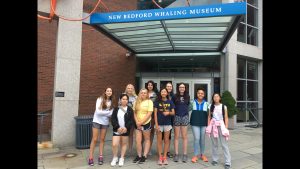Search results for: Hawaiian Airlines Customer Service 800-299-7264 Online Flight Reservations
Surf Clams
Surf Clams In the marketplace, one-year-old surf clams are known as “New England Butter Clams” – a relatively new product on the market. Farming New England Butter Clams means they can be harvested at a size in which they are tender, buttery and sweet – as well as easy and versatile to prepare. This results…
Read MorePattern of Inheritance of Microsatellite Loci in the Squid Loligo pealed (Mollusca: Cephalopoda)
Pattern of Inheritance of Microsatellite Loci in the Squid Loligo pealed (Mollusca: Cephalopoda) Maxwell, M.R., K.M. Buresch, and R.T. Hanlon Marine Biotechnology, Vol. 2, pp. 517-521, 2000 WHOI-R-00-011
Read MoreSea Grant Research Highlighted at WBNERR
Two Sea Grant-funded researchers will be featured during the 2019 Coffee House Series at the Waquoit Bay National Estuarine Research Reserve, in Falmouth, Mass. All talks run from 6:30 – 8 p.m. April 9 – “Marshes, Mosquitos and Sea Level Rise” Sheron Luk, MIT/WHOI Joint Program What’s the effect of ditches that were dug decades…
Read More2020 Program Development Projects
Program Development Projects 2024 Projects John Logan, MA Division of Marine Fisheries: Using eDNA to assess the importance of eelgrass as juvenile winter flounder habitat 2023 Projects Donna Dimarchopoulou, Mohammed Hashim, Chloe Dean, Adam Subhas, WHOI: Elevator pitches for labs: Building hands-on tools to communicate lab-based research. Naomi Steckman, Beyond the Bounds: Beyond the Bounds…
Read MoreTeacher Workshop Oct. 2019
Carbon Cycling in Coastal Wetlands Presenters: Dr. Meagan Eagle Gonneea, Research Physical Scientist, Woods Hole Coastal and Marine Science Center, USGS Dr. Anne Giblin, Director, Ecosystems Center, Marine Biological Laboratory Please note: This workshop will take place at the Waquoit Bay National Estuarine Research Reserve (WBNERR), 131 Waquoit Highway, East Falmouth, MA 02536 Description: The…
Read MoreWHOI-R-93-012 Weldman, C.R. Cyclic Spit Mo
WHOI-R-93-012 Weldman, C.R. Cyclic Spit Mo
Read MoreHistoric Shipwreck Management: Meeting of Experts II
Historic Shipwreck Management: Meeting of Experts II Hoagland, P. 51 pp., 1993, $3.00 WHOI-T-93-002
Read MoreCitizen Science: Improving Water Quality in Waquoit Bay
Citizen Science: Improving Water Quality in Waquoit Bay By Dr. Nicole Millette Nicole Millette in the lab March 2018 – Nutrient pollution, particularly nitrogen, is a widespread problem in coastal waters, and a vexing issue for environmental managers as well as those living near these waters. As a Sea Grant-funded Postdoctoral Fellow in Marine Policy,…
Read MoreAn Ethogram of Body Patterning Behavior in the Biomedically and Commercially Valuable Squid Loligo pealei off Cape Cod, Massachusetts
An Ethogram of Body Patterning Behavior in the Biomedically and Commercially Valuable Squid Loligo pealei off Cape Cod, Massachusetts Hanlon, R.T., M.R. Maxwell, N. Shashar, E.R. Loew, and K.-L. Boyle Biol. Bull., Vol. 197, pp. 49-62, 1999 WHOI-R-99-005
Read MoreEvaluating the Risks of Offshore Oil Development Environmental Impact
Evaluating the Risks of Offshore Oil Development Environmental Impact Lahey, W.L. and T.M. Leschine Assessment Review, Vol. 4, No. 3/4, pp. 271-286, 1983 WHOI-R-83-024
Read More

